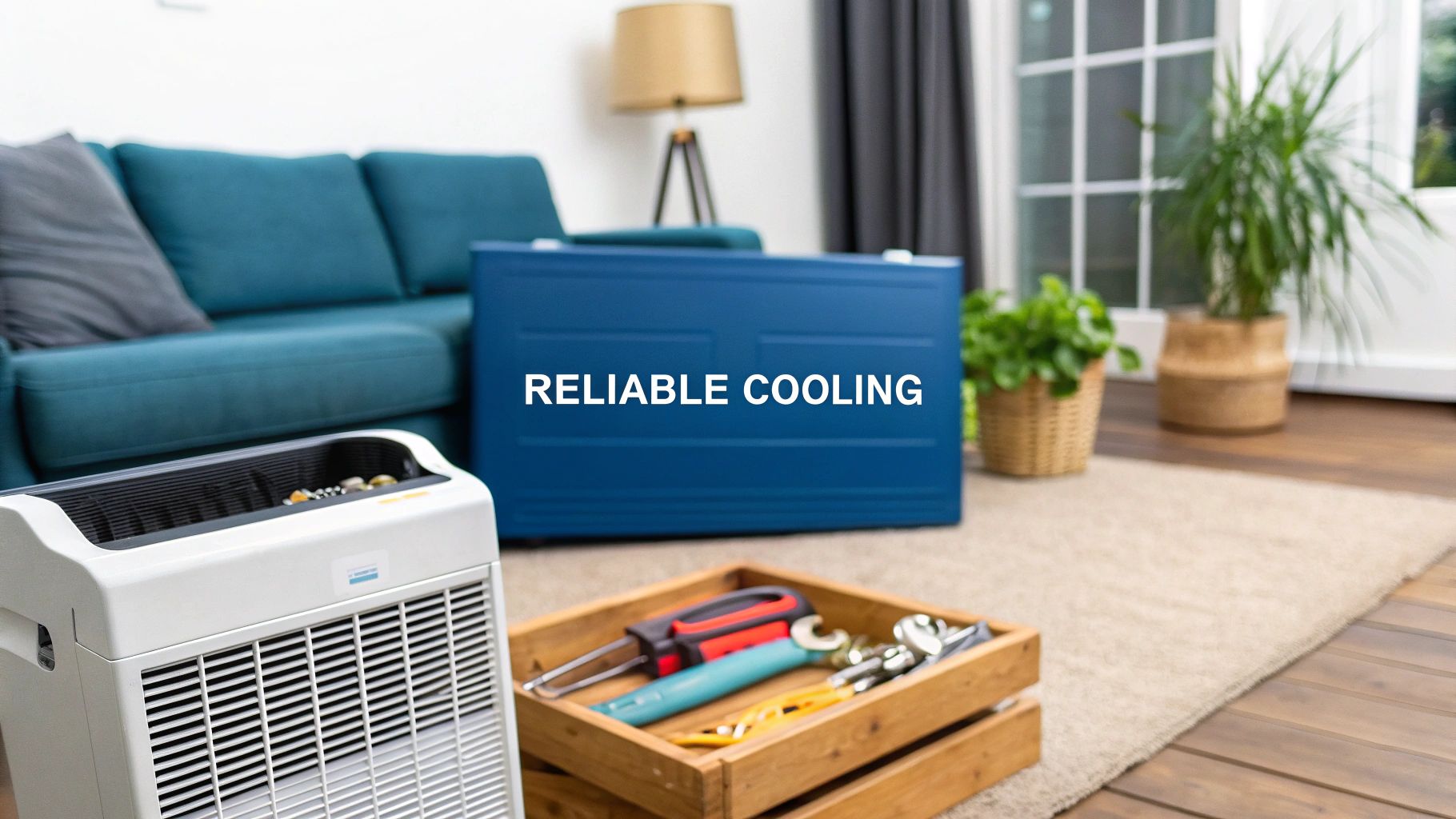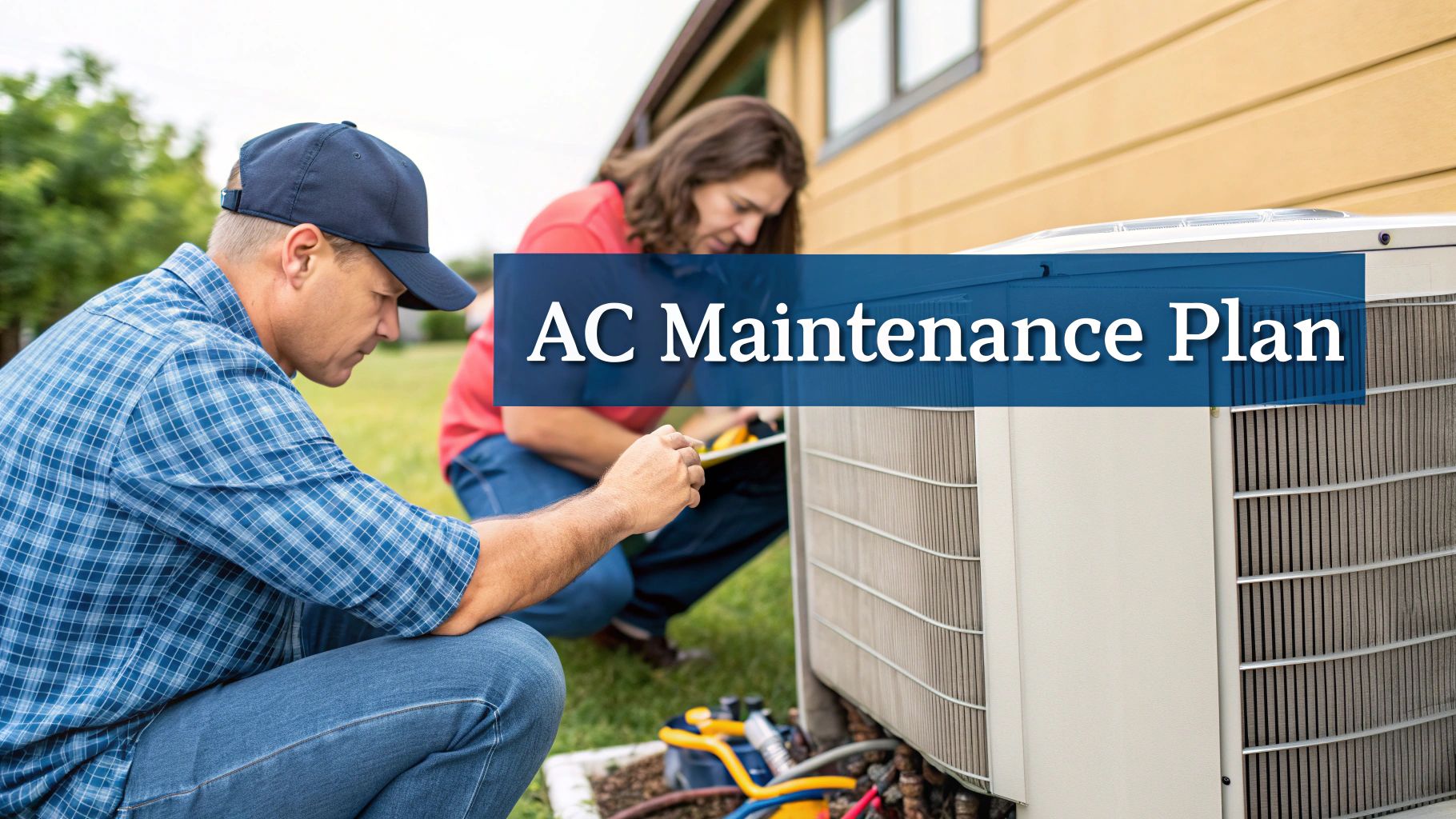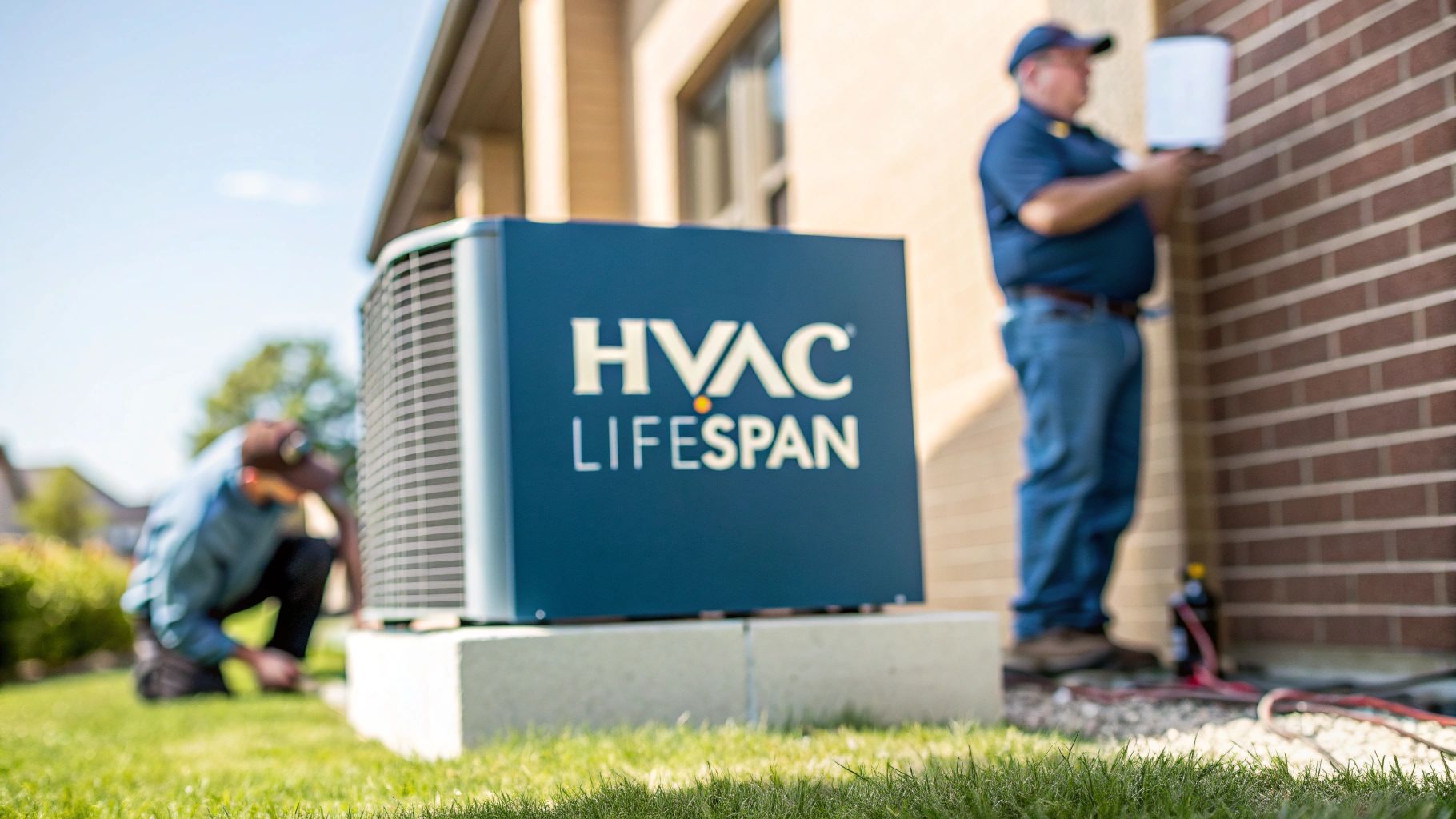An air conditioning service agreement is basically a contract you set up with an HVAC company for regular check-ups on your cooling system. Think of it less like a repair service and more like a health plan for your AC. The whole idea is to catch problems early, keep your energy bills down, and help your unit last as long as possible.
What an AC Service Agreement Really Means
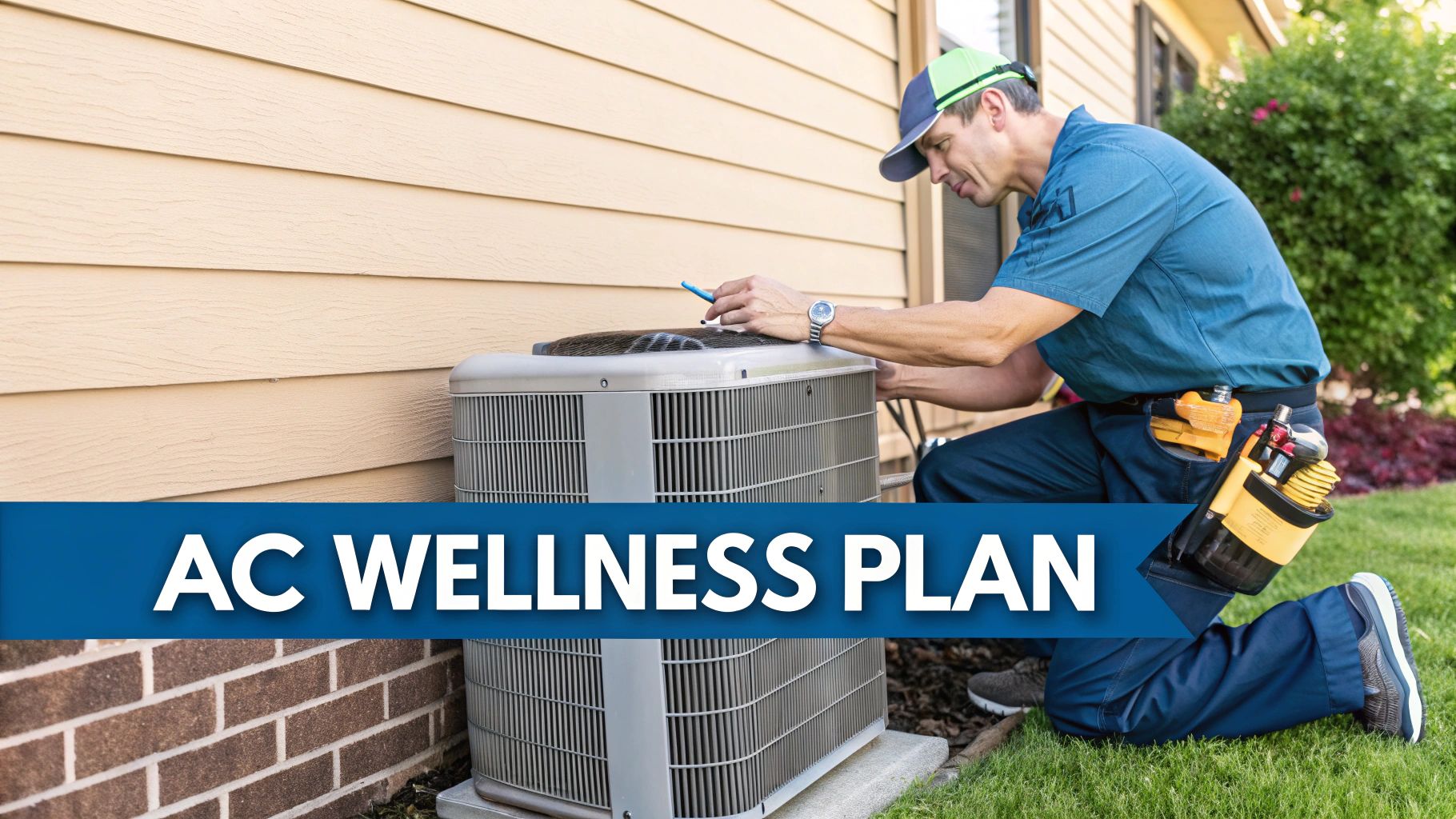
Here’s a simple way to look at it: your air conditioner is a lot like your car. You wouldn't dream of driving it for years without changing the oil or checking the brakes, right? You know that would just be asking for a major breakdown on the side of the road.
An air conditioning service agreement is that same kind of preventative care for your AC. Instead of waiting for a disaster—like your system dying on the hottest day of the year—you're getting ahead of it. It’s a formal arrangement where an HVAC pro takes on the responsibility of keeping your system humming along.
The Core Components of a Plan
At its heart, a service plan is all about prevention. Rather than scrambling for an expensive emergency call, you pay a predictable fee (usually monthly or once a year) for a whole package of services. This shifts your relationship with the HVAC company from a frantic, reactive one to a calm, proactive partnership.
Most solid agreements will include these key things:
- Scheduled Tune-Ups: You'll typically get two visits a year—one for your AC before summer hits and one for your furnace before winter. The technician cleans, inspects, and tweaks everything for peak performance.
- Priority Service: This is a big one. When something does go wrong, members get to skip to the front of the line. During a heatwave, that can be a lifesaver.
- Discounts on Repairs: You'll almost always get a percentage off any parts or labor for repairs that pop up outside of the regular maintenance visits.
A well-structured service agreement isn't just a checklist of tasks; it's a commitment to your home's comfort and your system's longevity. It shifts the focus from fixing what’s broken to ensuring things don't break in the first place.
Service Agreement vs. No Agreement: A Quick Comparison
The difference really shows up over the long run. Anyone who manages properties and deals with things like rental agreement templates knows the value of having responsibilities and benefits clearly laid out. An AC service agreement works the same way—it protects your investment.
Without a plan, every service call starts at square one. You'll pay premium rates and get stuck at the back of the line during busy seasons. With a plan, you have a team already looking out for you, making sure your system is ready for whatever the weather throws at it.
Here’s a quick breakdown of what that looks like.
| Feature | With a Service Agreement | Without a Service Agreement |
|---|---|---|
| Maintenance | Scheduled, proactive tune-ups included | Reactive, only when a problem occurs |
| Repair Costs | Often includes discounts on parts & labor | Full price for all repairs, plus emergency fees |
| Emergency Priority | Priority service, faster response times | Standard wait times, often days during peak season |
| System Lifespan | Extended due to regular care | Potentially shortened due to neglect |
| Energy Efficiency | Optimized for lower utility bills | Declines over time, increasing energy costs |
| Budgeting | Predictable annual maintenance cost | Unpredictable, high-cost emergency expenses |
The bottom line? This proactive approach not only saves money over time but also provides invaluable peace of mind.
The Real Benefits of an AC Maintenance Plan

So, what’s the big deal with these service agreements? It’s simple: the real value shows up in your bank account, your home’s comfort, and your overall peace of mind. These plans are specifically designed to give you a tangible return that easily outweighs the cost. The benefits aren't just fuzzy concepts; they are concrete advantages you can actually see and feel.
Think of it like this: a small, consistent investment in maintenance helps you avoid a massive, unexpected expense down the road. It’s the difference between a routine check-up and emergency surgery for one of your home's most essential appliances.
Let’s break down exactly what those powerful benefits look like in the real world.
Extend Your AC Unit’s Lifespan
For any homeowner, the single most dreaded HVAC event is a full system replacement. It's expensive. An air conditioner is a complex piece of machinery, and just like your car, it wears down over time. Without regular care, that wear and tear happens a lot faster.
A maintenance plan is like an anti-aging regimen for your AC. During a tune-up, a technician will clean critical components, lubricate moving parts, and tighten electrical connections. This basic care reduces the daily strain on the system, preventing the kind of slow, accumulating damage that leads to premature failure.
In fact, a well-maintained AC unit can last up to 50% longer than one that's been neglected. That means you could put off a costly replacement for years, saving thousands of dollars and getting a much better return on your initial investment.
Boost Energy Efficiency and Lower Bills
When an air conditioner isn't properly maintained, it has to work much harder to cool your home. Dirty coils, low refrigerant, or clogged filters force the system to run longer and pull more power just to hit the temperature on your thermostat. This inefficiency hits you right where it hurts: your monthly utility bill.
Regular tune-ups ensure your system runs at peak performance. It's not a small difference, either—routine maintenance can improve your AC’s efficiency by up to 15%. For an average household, that translates into significant savings every single month, especially during those long, sweltering Florida summers.
Consider these numbers:
- A dirty air filter alone can increase your AC's energy use by 5% to 15%.
- Dirty condenser coils can slash efficiency by a whopping 30% or more.
A service agreement tackles these issues head-on, making sure you aren’t paying more than you have to for a cool, comfortable home. Often, the savings on your energy bills alone can cover the annual cost of the plan.
Improve Your Home's Air Quality
Your HVAC system does more than just cool the air; it circulates it through every room in your home, over and over again. If that system is packed with dust, mold, or other debris, it’s constantly pushing those contaminants into the air you and your family breathe.
This can easily aggravate allergies, asthma, and other respiratory problems. A key part of every maintenance visit is a deep cleaning of the system's internal components, like the coils and blower motor. This gets rid of that nasty buildup, resulting in cleaner, healthier indoor air for everyone.
The preventative nature of AC service agreements contributes significantly to managing your general property maintenance and repair needs, protecting not just your equipment but also the health of your home's environment.
Catch Small Problems Before They Become Disasters
Perhaps the biggest financial benefit is preventative repair. A tiny fray in a wire or a small refrigerant leak might not seem like a big deal today, but these are often the warning signs of a catastrophic system failure waiting to happen.
During a scheduled tune-up, a trained technician has the expert eye to spot these little red flags and can often fix them on the spot for a minimal cost. This is infinitely better than waiting for that frayed wire to cause a major electrical failure or for low refrigerant to burn out your compressor—a repair that can easily cost thousands.
The entire focus of an AC maintenance plan is to keep your system humming along in top shape. Ultimately, it's an investment in reliability and financial predictability. It helps you dodge the stress of sudden breakdowns, saves you real money on energy and repairs, and keeps your home a comfortable sanctuary all year long.
What Every Good Service Agreement Should Include
Trying to make sense of different air conditioning service agreements can feel overwhelming. Not all plans are the same, and the real value is always buried in the fine print. A solid agreement isn't just a piece of paper; it’s your roadmap to keeping your AC running smoothly for years to come and protecting your wallet from surprise breakdowns.
To spot a great deal, you have to look past the price tag. A quality plan will always lay out exactly what services are included to keep your unit efficient and dependable. It’s about more than just promises—it’s about the specific, critical tasks that actually prevent system failures.
Think of this as your buyer's guide. We'll break down the non-negotiable items that separate a genuinely comprehensive plan from a hollow one, so you can make a choice you feel good about.
The Foundation: A Technical Services Checklist
The heart of any worthwhile air conditioning service agreement is the list of hands-on tasks the technician will perform during a tune-up. A quick look-see just doesn't cut it. These are the absolute must-haves that protect your investment.
Here’s what you should see clearly listed:
- Condenser and Evaporator Coil Cleaning: Dirty coils are one of the biggest culprits behind inefficiency and breakdowns. A thorough cleaning is a must for proper heat exchange.
- Refrigerant Level Checks and Adjustment: The wrong amount of refrigerant can wreck your compressor, which is a costly fix. A technician needs to check the levels and adjust them to the manufacturer's exact specs.
- Electrical Connection Tightening: Over time, vibrations can loosen electrical connections, creating a serious fire hazard and causing parts to fail. Every connection needs to be checked and tightened.
- Thermostat Calibration: If your thermostat is off, your system won't cycle correctly, leaving you uncomfortable and wasting energy. The tech should make sure it’s reading the room temperature accurately and controlling the unit as it should.
If a plan you're looking at doesn't explicitly mention these basic services, that’s a major red flag. For a deeper dive into what a pro-level visit looks like, you can check out a complete HVAC preventive maintenance checklist to see what the experts look for.
The infographic below gives you a simple way to quickly size up the core parts of any service agreement you're considering.
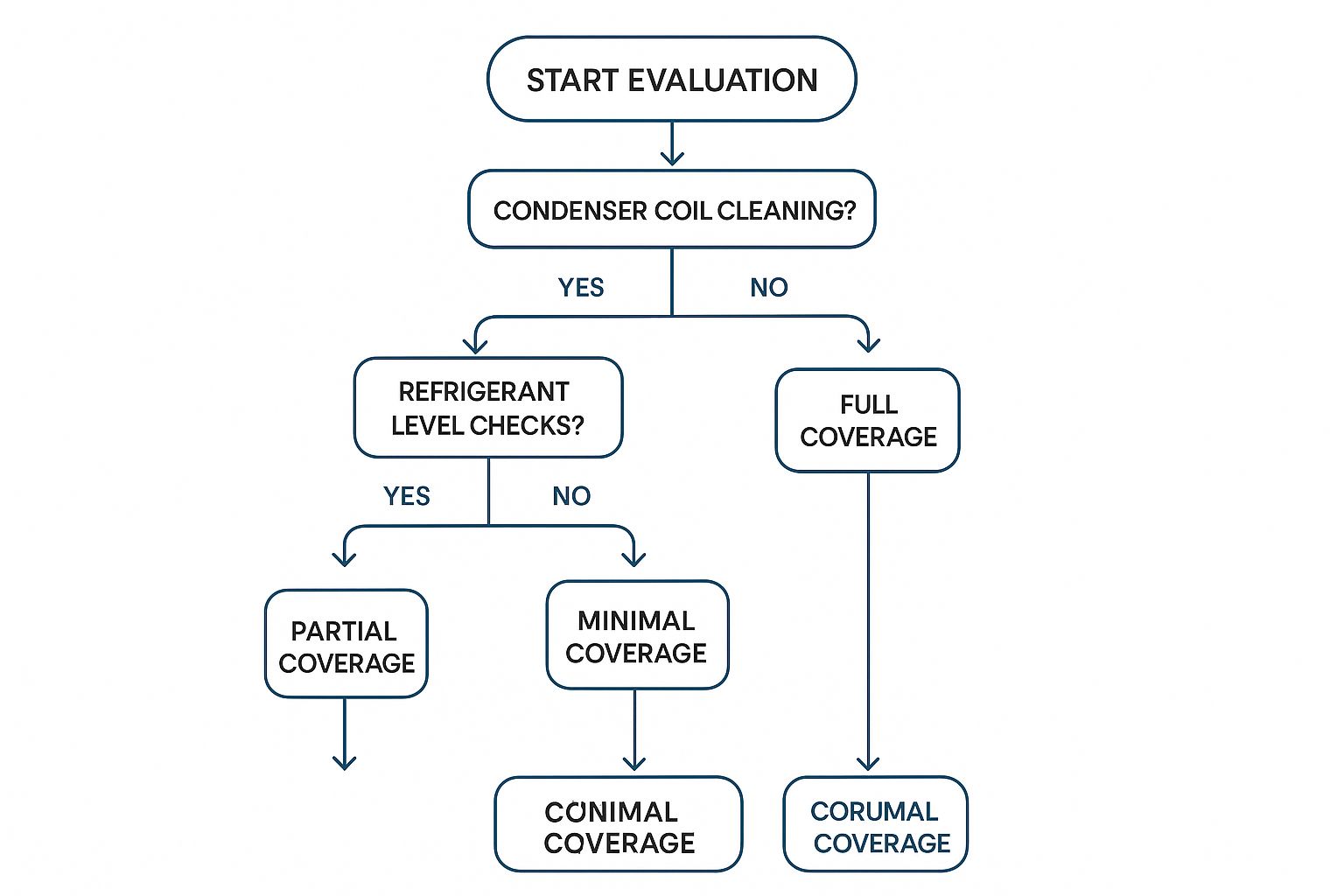
As you can see, the more of these essential checks a plan includes, the more you can trust that it offers real, reliable coverage for your system.
Reading Between the Lines: The Fine Print
Beyond the technical checklist, the contract’s terms and conditions are where you'll find its true value—especially when you need help the most. This is where you find out how the company has your back when things go wrong. Pay close attention to these three areas.
1. Parts and Labor Discounts
Most plans will offer a discount on repairs, but the specifics matter. A 15% discount is pretty standard in the industry. Be careful with vague phrases like "discounts on select repairs." A good plan will state the exact percentage and tell you if it applies to both parts and labor.
2. Emergency Response Time Guarantees
When your AC gives out during a Florida heatwave, how fast will someone show up? Many plans promise "priority service," but the best ones tell you exactly what that means. Look for a guaranteed response time, like "service within 24 hours" for members. This is your assurance that you won’t be left sweating for days during the busiest time of year.
3. Cancellation and Transferability Policies
Life happens. What if you sell your house? A homeowner-friendly agreement will let you transfer the plan to the new owner, which can be a nice little perk for your home sale. You should also check the cancellation policy to make sure you can get out of it without facing huge penalties.
The true measure of an air conditioning service agreement isn’t just the maintenance it provides, but the support and security it guarantees when you're facing an unexpected and stressful system failure.
By looking closely at both the technical services and the contractual fine print, you can confidently tell a flimsy offer from a plan that provides genuine, long-term peace of mind.
Understanding the Costs and Plan Tiers
So, let's talk about the big question on everyone's mind: "How much is an air conditioning service agreement going to set me back?" It's a fair question, and the answer isn't just a number pulled out of thin air. The cost really boils down to the level of protection and service you're getting.
Think of it like car insurance. Covering a brand-new sports car is going to cost more than insuring a ten-year-old family sedan. Why? Because the risk and potential repair costs are worlds apart. The same logic applies directly to your air conditioner. The price of a service plan is carefully figured out based on your specific home and equipment.
Several key things influence that final number. Getting a handle on them will help you understand why one company's quote might look different from another's.
What Determines the Price of a Service Plan
The cost of an air conditioning service agreement isn't random; it's shaped by a few key factors. HVAC pros look at the potential work and risk involved to come up with a fair price.
Here are the usual suspects:
- System Age and Condition: An older unit that's seen better days is a higher risk for a breakdown. Because of that, a plan for an aging system will likely cost more than one for a new, high-efficiency model.
- Size of Your Home and System: A sprawling house with a powerful, complex HVAC system naturally takes more time and effort to service than a small condo with a simple setup.
- Type of System: The cost to maintain a standard central air conditioner will be different from that of a more specialized system, like a ductless mini-split or a geothermal unit.
- Level of Coverage: This is the biggest driver of cost. A basic plan that just covers your annual tune-ups will be much easier on the wallet than a premium plan that includes parts, labor, and emergency service guarantees.
This approach means you're only paying for the level of service your system actually needs.
Comparing Common AC Service Agreement Tiers
Most HVAC companies offer their service agreements in different tiers, kind of like a Netflix subscription. This setup lets you pick the level of protection that fits your budget and your comfort level with unexpected repair bills. While the names might change from company to company, they usually fall into three main categories.
Here’s a look at what you can typically expect at each level.
Comparing Common AC Service Agreement Tiers
This table breaks down the common features you'll find in Basic, Standard, and Premium plans. It helps you see exactly what you're getting for your money as you move up the ladder.
| Feature | Basic Plan | Standard Plan | Premium Plan |
|---|---|---|---|
| Annual Tune-Ups | Included (2 visits per year) | Included (2 visits per year) | Included (2 visits per year) |
| Priority Service | Included | Included | Included (Guaranteed Response) |
| Repair Discounts | 10-15% off parts & labor | 15-20% off parts & labor | 20-25% or higher |
| Diagnostic Fees | Discounted or standard rate | Waived during business hours | Waived 24/7, including after-hours |
| Parts Coverage | Not included | Discounted on most parts | Covers many common parts |
| Labor Coverage | Not included | Discounted | Often fully included for repairs |
| Typical Annual Cost | $150 – $250 | $250 – $400 | $400 – $600+ |
As you can see, the more you pay upfront, the more you're insulated from the shock of a big repair bill down the road. A premium plan basically acts as an insurance policy against most common AC problems.
The right tier for you really comes down to your personal comfort with risk. A basic plan is a fantastic preventative tool, while a premium plan is an investment in total peace of mind.
It's no surprise that the entire HVAC services market is growing, particularly when it comes to maintenance and repair. This boom is fueled by homeowners wanting better energy efficiency and smart home integration. You can take a deeper dive into these trends by exploring the full research on the HVAC services market. This trend really highlights how much people value taking proactive care of their systems.
At the end of the day, it's best to see an air conditioning service agreement not as a cost, but as a smart investment in one of your home’s most important appliances.
How to Choose the Right HVAC Company for Your Plan

An air conditioning service agreement is a powerful tool, but let's be honest—it’s only as good as the company that stands behind it. A contract can look perfect on paper, but if the provider is unreliable or unqualified, that piece of paper won’t do much to keep you cool.
Think of it this way: you wouldn't hire a chef just by looking at a menu; you'd want to know if they can actually cook. It's the same with an HVAC company. You need to vet them to make sure they have the skill, experience, and integrity to follow through on their promises.
Doing a little homework now will save you from massive headaches down the road. When you partner with a trustworthy company, your investment in a service plan truly pays off with reliable comfort and genuine peace of mind.
Verifying Credentials and Qualifications
Before you dive into the details of any service plan, start with the absolute basics. Any legitimate HVAC company should be ready and willing to show you proof of their qualifications. This isn't just about finding a good company; it's about steering clear of the unqualified ones who could put your home and expensive equipment at risk.
Your initial checklist should cover these non-negotiables:
- License and Insurance: The company absolutely must be licensed to work in Florida. They also need to carry both liability insurance and worker's compensation to protect you from any liability if an accident or property damage occurs on your watch.
- Technician Certifications: Keep an eye out for companies whose technicians are NATE-certified (North American Technician Excellence). This is the gold standard in our industry, proving they have real-world knowledge that’s been put to the test.
- Experience and Local Presence: How long have they been serving your community? A company with deep roots in Palm Beach County has a local track record and a reputation they need to protect.
This first step is crucial for ensuring you're dealing with a real, accountable business. When you're ready to look for a provider, our guide to finding the best local HVAC contractors near me is a great place to start.
Assessing Reputation and Customer Feedback
Once you've confirmed a company is qualified on paper, it’s time to see what actual customers are saying. A company's online reputation gives you a transparent, unfiltered look into how they really operate day-to-day. Don't just glance at the star rating—dig into the actual reviews.
Look for patterns in what people are saying. Are customers consistently praising their punctuality, professionalism, and clear communication? Or do you see recurring complaints about missed appointments, surprise charges, or problems that never seem to get fixed?
A strong online presence with a wealth of positive reviews is a huge indicator of a company's commitment to its customers. It shows they not only do good work but also care about the relationships they build with homeowners.
The market for air conditioning maintenance is booming, with projections hitting $150 billion by 2025. All this growth means more companies are jumping into the game, making it more important than ever to pick one with a proven history of success.
Critical Questions to Ask Before You Sign
With your research narrowed down, the final step is to talk directly with your top choices. How they answer your questions will tell you a lot about their service quality and what you can expect as a plan member. Don't be shy—ask direct, specific questions.
Here are a few essential ones to get the ball rolling:
- "What specific tasks are on your tune-up checklist?" A good company will have no problem walking you through a detailed list, proving their maintenance visits are thorough.
- "What's your guaranteed emergency response time for plan members?" You want a specific timeframe, like "within 24 hours," not just a vague promise of "priority service."
- "Are your technicians employees or subcontractors?" Companies with in-house employees typically provide more consistent training and hold their team to higher standards.
- "What brands of equipment do you specialize in?" While most techs can service any brand, it's good to know if they have deep expertise with your particular unit.
Choosing the right partner is the final, most important piece of the puzzle. By taking these steps, you can confidently pick an HVAC company that will honor its service agreement and keep your home comfortable for years to come.
Common Questions About AC Service Agreements
https://www.youtube.com/embed/ZCs40kXhMog
Even after laying out all the features and benefits, it's completely normal to have a few questions rolling around in your head about air conditioning service agreements. Deciding how to care for your home's most expensive appliance is a big deal, and you should feel 100% confident in your choice.
To help you get there, we've rounded up the questions we hear most often from homeowners. Think of this as the final piece of the puzzle, where we give you straight answers to clear up any lingering doubts.
Are AC Service Agreements Really Worth the Money?
This is the big one, isn't it? The short answer is a resounding yes—for most homeowners, they absolutely are. But the real value isn’t just about dodging one huge repair bill. It’s about all the smaller, consistent savings that pile up over time.
An air conditioning service agreement is really an investment in preventing problems before they start. You pay a predictable annual fee, and in return, you get financial perks in a few key ways:
- Lower Energy Bills: When your AC is tuned up regularly, it runs how it was designed to. A properly maintained unit can use up to 15% less energy, a savings you'll see on your utility bill month after month.
- Avoiding Early Replacement: The single biggest check you'll ever write for your HVAC system is for a brand new one. Good maintenance can add years to your unit's life, pushing that massive expense far down the road.
- Cheaper Repairs: Little problems get spotted and fixed during a tune-up before they have a chance to become catastrophic failures. And when you do need a repair, the discounts on parts and labor that come with the plan really take the sting out of the final bill.
When you add it all up, the annual cost of the plan often pays for itself, sometimes several times over. It’s a smart way to protect your budget from those sudden, wallet-busting emergencies.
How Is a Service Agreement Different from a Home Warranty?
It's easy to get these two mixed up, but they serve very different purposes. A home warranty is a broad insurance-like policy that covers a bunch of different things in your house, from your dishwasher to your plumbing. An AC service agreement, on the other hand, is a specialized plan focused only on your heating and cooling system.
Here’s a simple way to think about it: a home warranty is reactive, while an air conditioning service agreement is proactive.
A home warranty is there to help you after something breaks. A service agreement is designed to prevent it from breaking in the first place.
This table breaks down the main differences:
| Aspect | AC Service Agreement | Home Warranty |
|---|---|---|
| Primary Goal | Proactive maintenance and prevention | Reactive repair or replacement after a failure |
| Technician Choice | You work with your chosen, trusted HVAC company | The warranty company chooses the contractor for you |
| Cost Structure | Annual fee for tune-ups and discounts | Annual premium plus a service call fee for each claim |
| Coverage Focus | Exclusively for your HVAC system | Covers multiple home systems and appliances |
So, while a home warranty can be a nice safety net, it’s no substitute for the dedicated, professional maintenance you get with a service plan.
How Often Should My System Be Serviced?
For your system to run its best and last as long as possible, you should have it professionally serviced twice a year. This isn't just a random number; the timing is specifically designed to get your equipment ready for its toughest seasons.
- A Cooling Tune-Up in the Spring: Before the summer heat really kicks in, a technician preps your air conditioner to handle the stress. This makes sure it's ready to cool your home efficiently without breaking down on the hottest day of the year.
- A Heating Tune-Up in the Fall: Before the cold weather arrives, your furnace or heat pump gets the same attention. This ensures it's running safely and is ready to keep your family warm all winter long.
This biannual schedule is the gold standard in the HVAC industry for a good reason. It tackles the specific wear and tear each system goes through, maximizing efficiency and catching problems before they turn into emergencies. An air conditioning service agreement handles the scheduling for you, so you never have to remember to make the call.
It's not just us saying this, either. The market shows that more and more homeowners are getting on board. The global HVAC maintenance service market was valued at around USD 92.8 billion in 2024 and is expected to keep growing. This is because people are realizing that being proactive about energy efficiency and equipment lifespan is just plain smart. You can read more about these market growth insights on Stellar MR. This trend points to one clear thing: proactive care is the future, and service agreements are leading the charge.
Taking care of your home's comfort system is one of the smartest things you can do as a homeowner. At Florida Cooling Group, we’ve built our service agreements to deliver real value and complete peace of mind. If you’re ready to make sure your AC is reliable, efficient, and prepared for whatever Florida throws at it, get in touch with us today.


 (561) 400-2205
(561) 400-2205